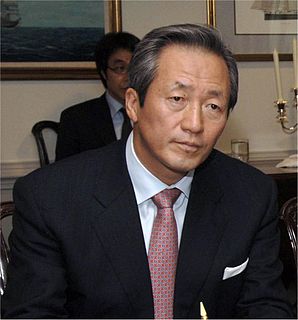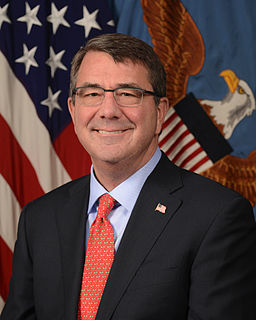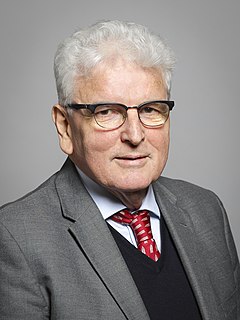A Quote by Jimmy Carter
When I was in the White House, I was confronted with the challenge of the Cold War. Both the Soviet Union and I had 30,000 nuclear weapons that could destroy the entire earth and I had to maintain the peace.
Related Quotes
One of the greatest concerns that I had when I became President was the vast array of nuclear weapons in the arsenals of the United States and the Soviet Union and a few other countries, and also the great proliferation of conventional weapons, non-nuclear weapons, particularly as a tremendous burden on the economies of developing or very poor countries.
The Cold War philosophy of Mutual Assured Destruction (MAD), which prevented the former Soviet Union and the United States from using the nuclear weapons they had targeted at each other, would not apply to President Mahmoud Ahmadinejad's Iran. For him (Ahmadinejad), Mutual Assured Destruction is not a deterrent, it is an inducement.
What is the only provocation that could bring about the use of nuclear weapons? Nuclear weapons. What is the priority target for nuclear weapons? Nuclear weapons. What is the only established defense against nuclear weapons? Nuclear weapons. How do we prevent the use of nuclear weapons? By threatening to use nuclear weapons. And we can't get rid of nuclear weapons, because of nuclear weapons. The intransigence, it seems, is a function of the weapons themselves.
My nation faces a fundamental challenge - survival. The regime is more threatened than ever before. My forefathers had it easy. The Great Leader, my grandfather, ruled with the support of the world's other superpower at the time, the Soviet Union, as well as our China. But today, the Soviet Union is history and China has become more integrated with the Western system. And the United States seeks regime change in my country. And yet, we have survived with our ideology and system intact. How? Because we have built a protection for ourselves in the form of nuclear weapons.
We could still have continued the arms race, but the arms race was pointless, and it was another reason we decided to start perestroika. It was senseless to continue to accumulate weapons. We had enough weapons to destroy life on Earth 1,000 times, and therefore it was very clear to us that the arms race could spiral out of control. A conflict could have started, as both the Americans and the Soviets realized, not out of a wrong political decision but because of a failure in the command-and-control systems.
It has always struck me as the world's great fortune that the two great superpowers were the United States and the Soviet Union, who managed the Cold War with meticulous care in retrospect. Imagine the European diplomats of 1914 or 1938 armed with nuclear weapons. It is easy to believe they would not have been as cautious.
European peace movement felt that the deployment of these missiles on European soil, on German soil would be a very great danger towards the Soviet Union in that those missiles could reach the Soviet Union, make it vulnerable within five to six minutes, that it could surgical strikes, strikes into the military infrastructure and that a strike into the military infrastructure could cause in fact World War III, an atomic world war and that this could also be used for first strike, for surgical search, first strike into the Soviet Union.
Presidents should be very careful at all times in discussing the use or non-use of nuclear weapons. Presidents since the cold war have used nuclear deterrence to keep the peace, and I don't believe that any president should make any blanket statements with respect to the use or non-use of nuclear weapons.
Here's the truth: the Soviet Union had thousands of nuclear weapons, and Iran doesn't have a single one. But when the world was on the brink of nuclear holocaust, Kennedy talked to Khrushchev and he got those missiles out of Cuba. Why shouldn't we have the same courage and the confidence to talk to our enemies? That's what strong countries do, that's what strong presidents do, that's what I'll do when I'm president of the United States of America.


































